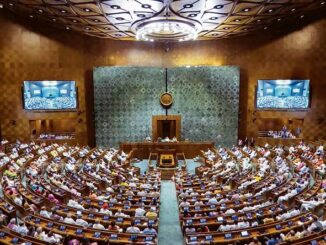
Immigration has long been a central issue in American politics, drawing heated debate, emotional appeals, and policy proposals from both sides of the political spectrum. As the 2024 election looms, immigration once again finds itself at the forefront of the national conversation. Voters are concerned, and politicians are divided, but this is not a new phenomenon. The United States‘ immigration system has been labeled as “broken” for decades, and the ongoing cycle of inaction has left millions of undocumented immigrants in limbo, while the issue has become a tool in election campaigns, rather than a subject for meaningful reform.
A Glimpse into History: The Legacy of Reagan’s Immigration Reform
The modern immigration debate is often traced back to the presidency of Ronald Reagan. In 1986, Reagan signed into law the Immigration Reform and Control Act (IRCA), which granted amnesty to nearly three million undocumented immigrants who had been living in the U.S. before 1982. This was a monumental decision that sought to address the growing issue of illegal immigration by providing a path to legal residency for millions of people. At the same time, the act also sought to strengthen border security and impose penalties on employers who knowingly hired undocumented workers.
The IRCA was designed as a comprehensive solution, but it had unintended consequences. While it succeeded in granting legal status to millions, it did not stem the flow of new undocumented immigrants. Employers continued to seek cheap labor, and border security measures were insufficient to deter illegal crossings. In the years following Reagan’s presidency, the number of undocumented immigrants in the U.S. steadily rose, with estimates reaching around 11 million a decade ago. Today, that number is believed to be closer to 18 million, though precise figures are difficult to verify due to the very nature of undocumented status.
The Rise of the Immigration Crisis in National Politics
Over the past three decades, immigration has remained a perennial issue in American elections. Both Democrats and Republicans have called for reform, but little has been accomplished. One of the central points of contention is how to deal with the millions of undocumented immigrants currently living in the U.S. The question is complex: Should they be granted legal status, or should they be deported? Should the focus be on securing the borders, or on integrating those who are already contributing to the economy?
The debate often becomes emotionally charged, particularly around election time. One narrative, largely championed by conservative voices, portrays undocumented immigrants as a threat to national security. This has led to proposals like the construction of a border wall, an effort spearheaded by former President Donald Trump. A portion of the wall was built, but it has not stopped illegal immigration. Critics argue that physical barriers are not a long-term solution, pointing out that immigrants continue to find other ways into the country, including overstaying visas or crossing borders at less fortified areas.
On the other hand, there is a broader economic argument that the U.S. needs immigrants, both documented and undocumented. The American economy has historically relied on immigrant labor, particularly in sectors such as agriculture, construction, and service industries. Undocumented immigrants, in particular, often fill jobs that Americans are unwilling to take. Despite their status, many of these immigrants pay taxes, contribute to Social Security, and help sustain industries that are vital to the U.S. economy. Numerous studies have shown that, far from being a drain on resources, undocumented immigrants contribute significantly to economic growth.
The Criminalization of Immigrants and the “Bogeyman” of Fear
A recurring theme in the immigration debate is the portrayal of undocumented immigrants as criminals. This narrative has been particularly prominent in recent years, with political rhetoric suggesting that “criminals are pouring into the country” through open borders. While it is true that some undocumented immigrants have committed crimes, this is by no means representative of the population as a whole. In fact, numerous studies have shown that immigrants, both documented and undocumented, are less likely to commit crimes than native-born Americans.
However, the focus on criminality has overshadowed the broader issue of how to deal with immigration in a humane and pragmatic way. Instead of addressing the root causes of immigration—such as poverty, violence, and political instability in countries of origin—politicians have used fearmongering tactics to garner votes. This approach has polarized the debate, making it difficult for lawmakers to work together on a comprehensive immigration solution.
The Failure to Act: Why the System Remains Broken
Despite the constant rhetoric about fixing the immigration system, little progress has been made. The root of the problem lies in the deep political divide between Democrats and Republicans, which has prevented meaningful legislative action. Democrats have generally favored a more inclusive approach, advocating for pathways to citizenship for undocumented immigrants and reforming the visa system to allow for more legal immigration. Republicans, on the other hand, have prioritized border security and stricter enforcement of immigration laws, often opposing amnesty or legal status for undocumented immigrants.
This divide has resulted in legislative gridlock. While both parties claim to want immigration reform, neither has been able to push through a comprehensive solution. In 2013, for example, the Senate passed a bipartisan immigration reform bill that included a pathway to citizenship for undocumented immigrants and increased border security. However, the bill stalled in the House of Representatives, and no further action was taken.
The failure to act has left millions of undocumented immigrants in a state of uncertainty. They live in fear of deportation, even as they contribute to the U.S. economy and society. Many have lived in the U.S. for decades, raised families, and built lives, yet they are denied basic rights and protections due to their legal status.
The Path Forward: Legalization and Border Security
If there is any hope of fixing the broken immigration system, it lies in a bipartisan approach that combines two key elements: legalization for undocumented immigrants and stronger border security. Granting legal status to millions of undocumented immigrants would not only provide them with a path to citizenship but also bring them out of the shadows and allow them to fully participate in American society. This would benefit not only the immigrants themselves but also the U.S. economy, as legal workers are more likely to invest in their communities, start businesses, and contribute to economic growth.
At the same time, stronger border security measures are necessary to prevent future illegal immigration. However, these measures should be smart and effective, focusing on modern technology and resources rather than simply building walls. A comprehensive approach would also involve addressing the root causes of immigration by working with other countries to improve economic conditions and reduce violence and instability.
The U.S. immigration system has been broken for decades, and both political parties bear responsibility for the current state of affairs. Instead of using immigration as a political football to win elections, lawmakers should work together to craft a comprehensive solution that balances the need for security with the economic and social realities of immigration. The time for action is long overdue, and the millions of undocumented immigrants who live in the U.S. deserve a fair and just path to legal status. Only through cooperation and compromise can the U.S. truly fix its broken immigration system and live up to its ideals as a nation of immigrants.





Be the first to comment